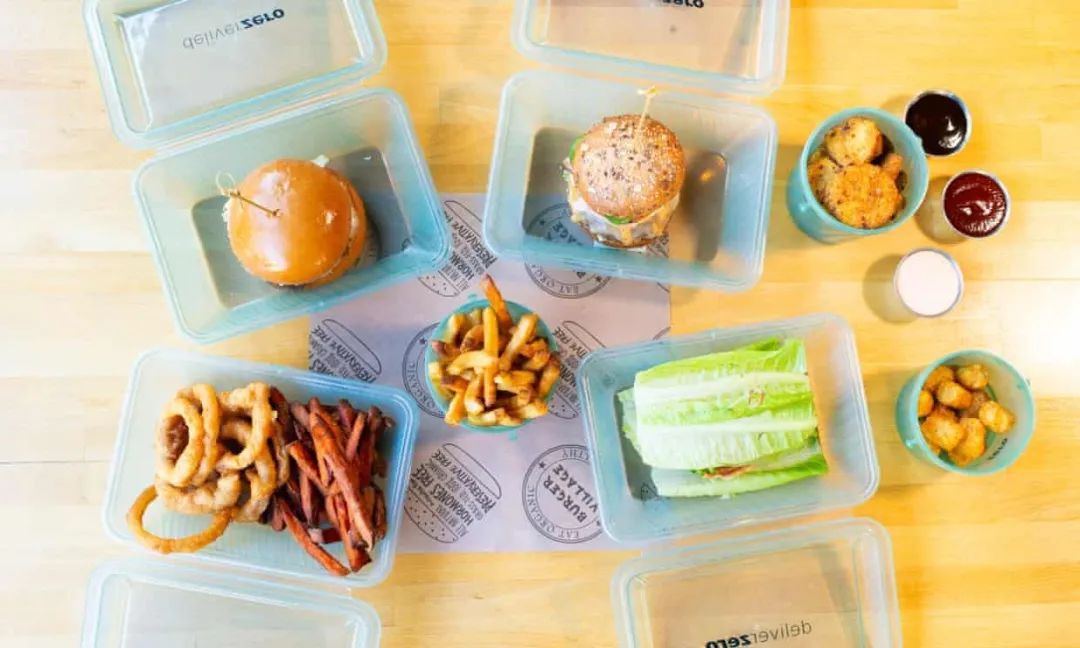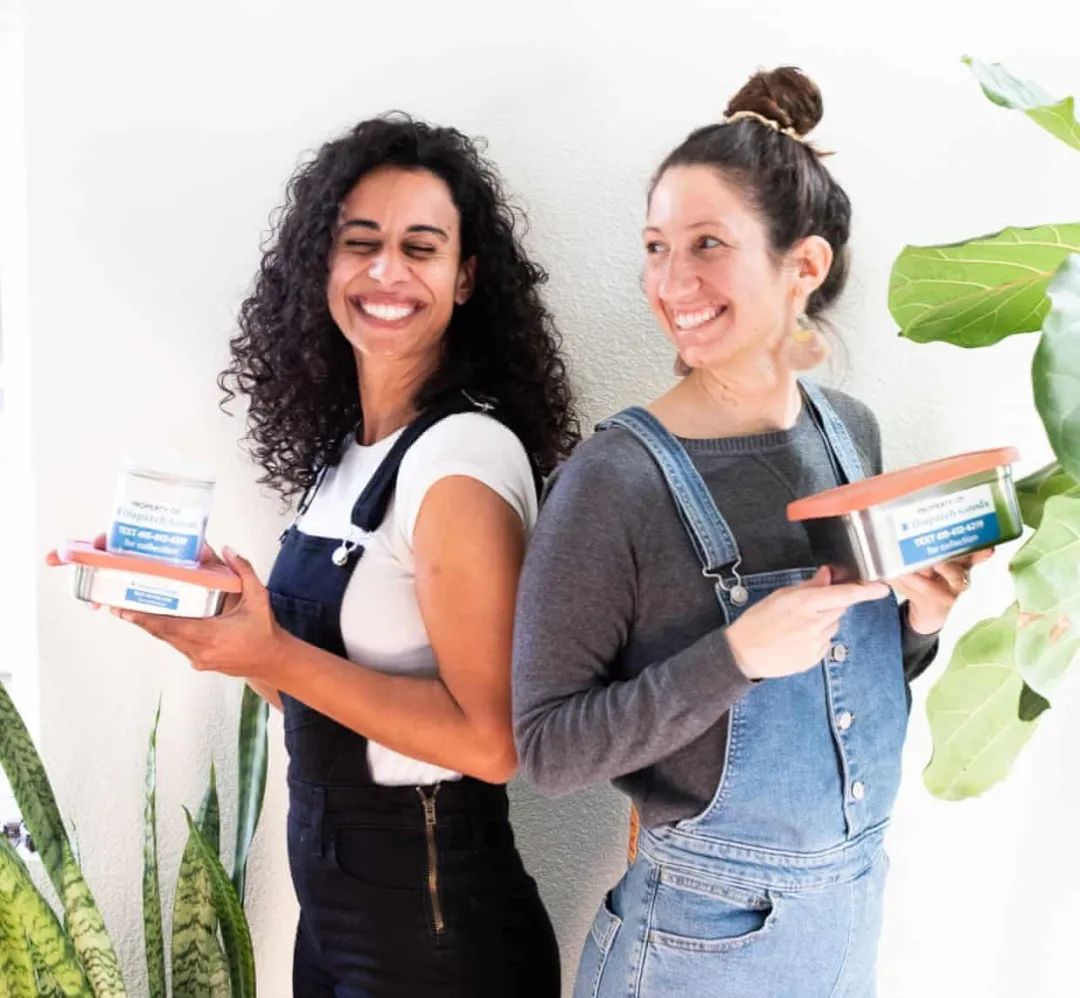"Will I be the only one who cares about the excessive amount of plastic waste from take-out?" Lauren Sweeney once asked herself this before she planned to promote recycled tableware.
"Would throwing them in the 'recyclables' bin be just a psychological relief? Is there a better solution?"
A survey by the American Ocean Conservancy shows that more than 70 percent of Americans order take-out once or three times a week. That means hundreds of billions of single-use plastic utensils are used and discarded each year.
In November 2019, Lauren Sweeney and two other co-founders, AdamFarbiarz and Byron Sorrells, joined forces to launch the DeliverZero website, a food ordering platform that uses recycled tableware. People can place take-out orders on the site, and unlike other sites, the take-out food is served in reusable boxes rather than disposable containers.
At first, the site was joined by only a handful of restaurants in the Brooklyn neighborhood, and the user interface was "very bad," but the app launched quickly anyway.
As chief marketing officer, Lauren Sweeney spent three months with her partners expanding DeliverZero in Brooklyn and was just about to "enter" Manhattan when the New Crown virus hit. In the summer of 2020, they temporarily shut down the DeliverZero website to redesign and plan for a new launch. At the time, New Yorkers were hunkered down at home, eager to eat different flavors of meals via takeout.
More than 130 restaurants in the two boroughs now use DeliverZero to deliver food in sturdy, green polypropylene containers that can be recycled, washed and reused up to 1,000 times.

DeliverZero is one of many startups trying to eliminate take-out packaging contamination, and Sweeney shared his experience that the key to success depends on the scale of the solution and consumer demand for sustainability.
Sweeney said, "We want to create a network of easy-to-collect and reusable containers to replace the use of single-use plastic packaging." Counting their useful life, reusable containers produce lower greenhouse gas emissions and use less energy and water than disposable containers.
Olga Kachook, senior manager of the U.S. Sustainable Packaging Coalition, said, "More and more innovative startups are proving that takeout can be an industry that doesn't generate a lot of disposable waste."
In Denver, Seattle, San Diego, Portland, Oregon, St. Paul, Minneapolis, Durham, North Carolina, and O'ahu, Hawaii, a growing number of restaurants are choosing to use recycled tableware instead of single-use plastic lunch boxes. Sustainable consumption is gaining traction in the United States.
Even major international brands are gradually experimenting. By early 2022, Burger King will be piloting reusable soda cups and large containers in New York City and Portland, Oregon. In some locations in the U.K., McDonald's has begun offering reusable coffee cups.
"We are on the cusp of a recycling revolution." said Bridget Croke, managing director of Closed Loop Partners, a circular economy investment firm, in a recent report. She predicts that the emerging model will "reconfigure recycling into our culture and behavioral norms.
The operation of using recycled tableware in take-out orders is basically the same as using disposable tableware, except that there are one or two extra steps to check the box for use and return before and after using recycled tableware.
The containers that startups provide to restaurants are often made of durable, reusable plastic that holds heat better than disposable plastic. Like books in a library, these recycled meal boxes have QR codes and electronic codes printed on them, so customers can scan the QR codes on the boxes with their cell phones to make an appointment to return the food as they get it. In terms of fees, some companies require customers to pay a monthly subscription fee of a few dollars, others require a small fee per box, and still others are free. Most companies charge restaurants a fee for the use of recycled cutlery that is comparable to the price of disposable plastic cutlery.
The return steps are similar: the customer returns the box to the designated restaurant or smart drop box. If the box is not returned within the specified time, the customer will be fined, or the deposit will be deducted.
Recycled tableware delivery platforms like DeliverZero have the option to pick up directly at their doorstep. Customers can return the boxes at any of the restaurants DeliverZero partners with, or return previously used boxes to the delivery person when they bring their next meal to their doorstep.
Instead of charging restaurants or customers for the boxes, DeliverZero charges restaurants 5%-20% of sales as a service fee. "The maximum will not exceed 22.5%." Sweeney emphasized. During the outbreak, some take-out platforms such as Seamless and GrubHub took the opportunity to raise their service fees to 30 percent of restaurant turnover, sparking outrage that eventually led to cities including New York and San Francisco introducing rules to tighten the cap on service fees on take-out platforms.
Today, DeliverZero is bringing reusable meal boxes to more major take-out platforms as a packaging option. Consumers can choose to use them for 25 cents per box, and Sweeney hopes that more consumers will choose to put their take-out food in reusable containers.
Maia Tekle and Lindsey Hoell, founders of Dispatch Goods, another supplier of recycled tableware, believe that the logistics chain is the key to solving the problem of plastic pollution from packaging. They want to further optimize the company's recycling process and make reuse as routine as recycling. They intend to add a "fourth bin" to the "non-recyclable bin", "recyclable bin" and "next to the food waste bin". "for recycled food containers.

Dispatch Goods founders Maia Tekle and Lindsey Hoell hold stainless steel recycling utensils
Sarah Currie Halpern, co-founder of waste reduction consultancy Think Zero, argues that it will be difficult for the private sector alone to mainstream the reusable model, and that regulators and the public sector will play a key role in creating a stronger recycling system. "A small tax on disposable items could fund the operation of new recycling sites and washing facilities. Local governments should do more to support emerging companies." For example, the city of Boulder has partnered with RepEATer to provide funding for reusable take-out containers and help them attract new restaurants and diners. Some cities are also taking action to limit or ban the use of single-use plastic containers in restaurants. Starting in 2023, Germany will require restaurants to use reusable eating utensils when serving takeout.
Hoell believes her reuse model will work in densely populated, ecologically strong areas of Northern California, and may take a while in rural Arkansas. But she believes that her "fourth bin" system will gradually spread to all metropolitan areas with populations over 500,000.
Sweeney is also optimistic about the prospects for using recyclable take-out containers. In New York, she says, it's a feature that some residents never turn on their ovens (never cook and rely on takeout). "Many people around the world are eating take-out food every day, which means there is a market everywhere for developing sustainable, reusable take-out systems."

